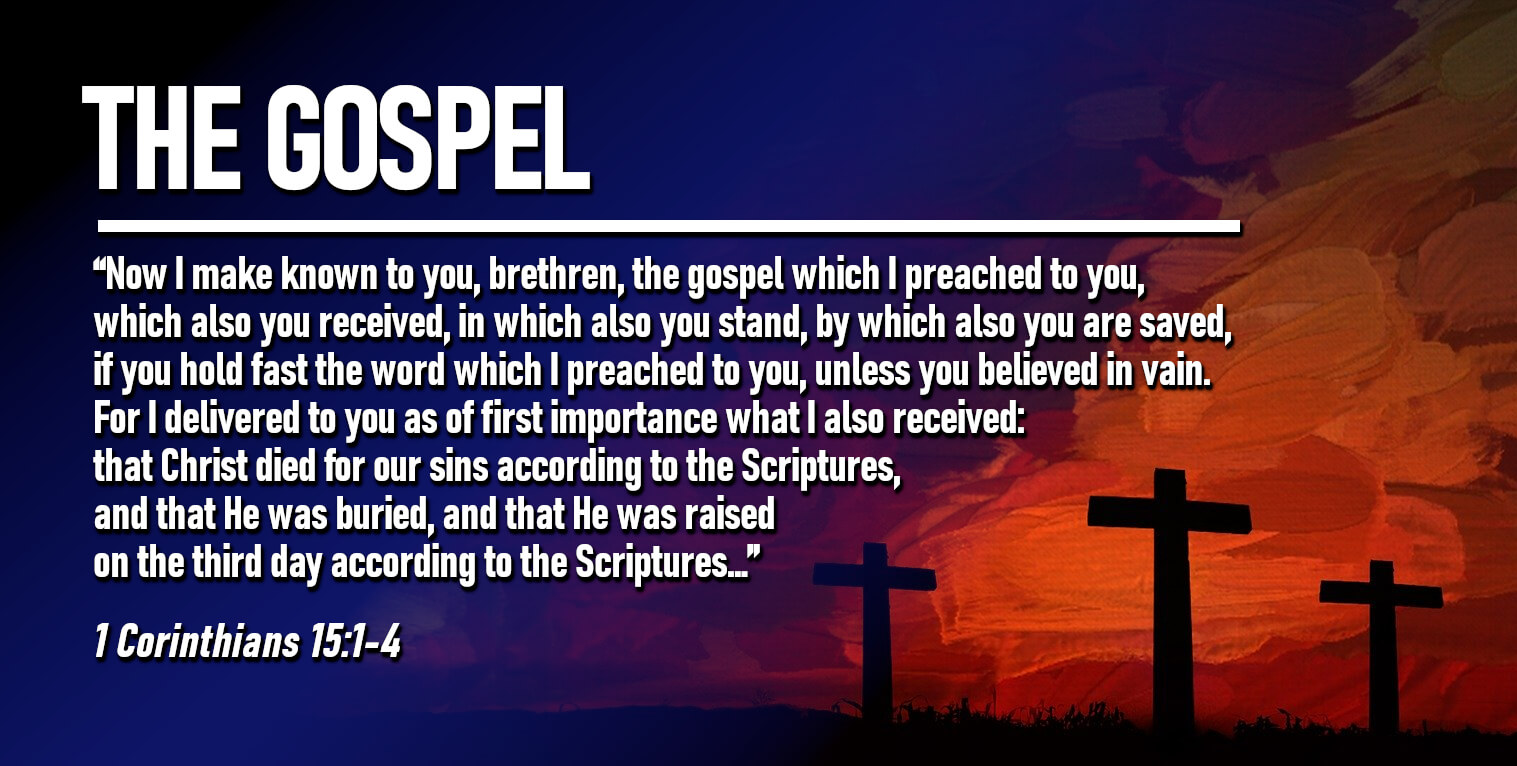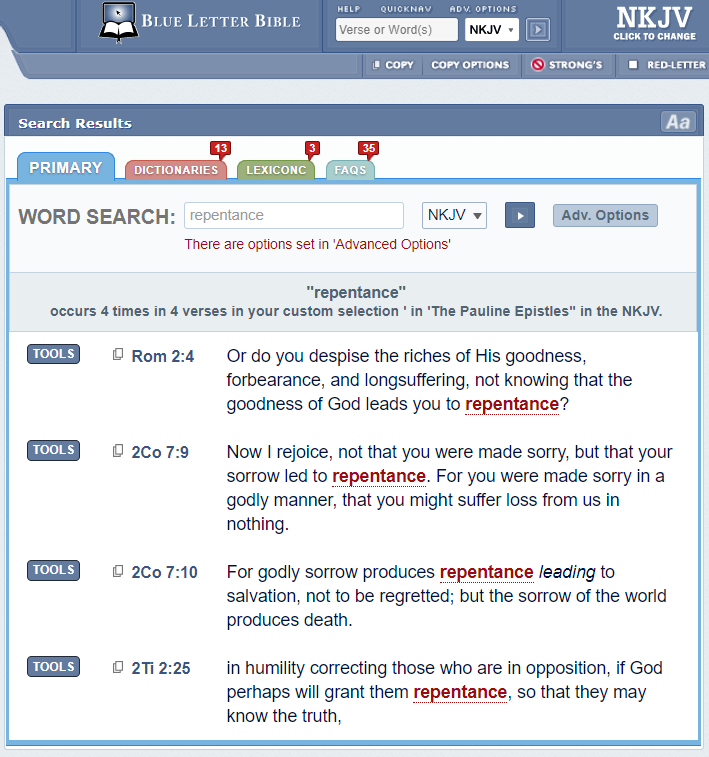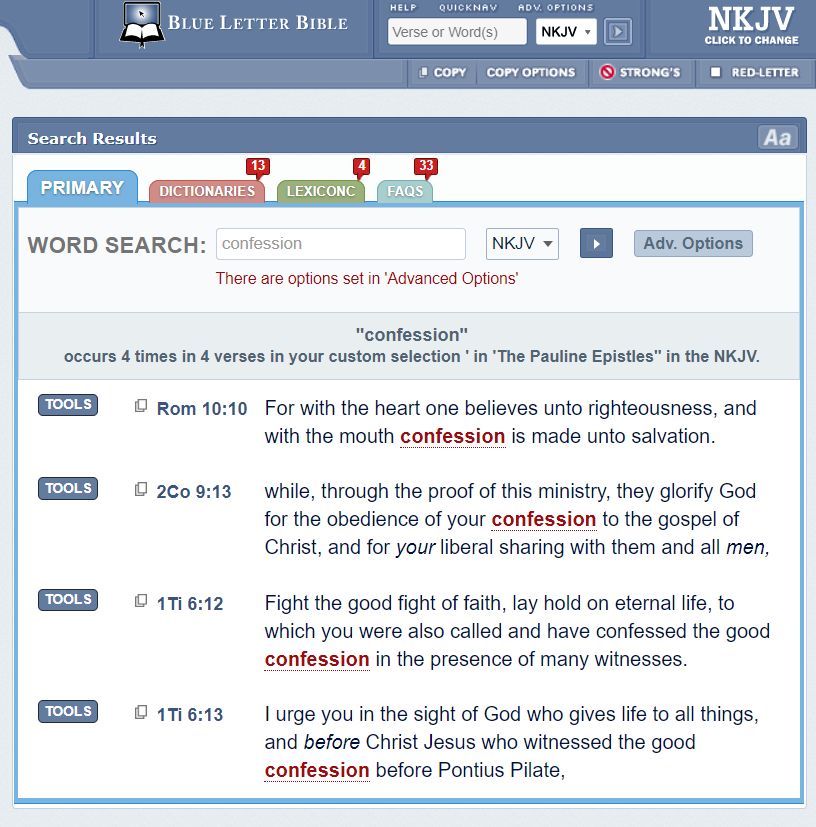
THE GOSPEL
“Now I make known to you, brethren, the gospel which I preached to you, which also you received, in which also you stand,
by which also you are saved, if you hold fast the word which I preached to you, unless you believed in vain.
For I delivered to you as of first importance what I also received:
that Christ died for our sins according to the Scriptures,
and that He was buried, and that He was raised on the third day according to the Scriptures…”
(1 Corinthians 15:1-4 NASB)
The Gospel, which is so clearly presented in 1 Corinthians 15:1-4, is very simple:
- Christ died for our sins according to the Scriptures
- He was buried
- He rose again the third day according to the Scriptures
It’s that simple.
But now the question is one of RESPONSE…
What is the appropriate response to the Gospel?
You must believe it.
IN THIS VIDEO…
“God is love, but sin can only go to a certain point, then it must be judged.”
“For I am not ashamed of the gospel of Christ, for it is the power of God to salvation for everyone who believes, for the Jew first and also for the Greek.”
(Romans 1:16 NKJV)
“…REPENT AND BELIEVE THE GOSPEL” (Mark 1:15)
Once again, the gospel message is simple:
- Christ died for our sins according to the Scriptures
- He was buried
- He rose again the third day according to the Scriptures
Very simple.
GotQuestions.org
What are the four spiritual laws?
Are there four laws that help us to understand the way to Heaven?
.
“FOUR SPIRITUAL LAWS”
.
Law #1: God loves you.
“For God so loved the world, that He gave His only begotten Son, that whoever believes in Him should not perish, but have eternal life.” (John 3:16)
Law #2: Man is sinful and separated from God.
“For all have sinned and fall short of the glory of God.” (Rom. 3:23)
“For the wages of sin is death.” (Rom. 6:23)
“But your iniquities have made a separation between you and your God.” (Isaiah 59:2)
Law #3: Jesus Christ is God’s only provision for man’s sin.
“I am the way, and the truth, and the life; no one comes to the Father, but through Me.” (John 14:6)
“But God demonstrates His own love toward us, in that while we were yet sinners, Christ died for us.” (Rom. 5:8)
Law #4: We must individually receive Jesus as Savior and Lord.
“But as many as received Him, to them He gave the right to become children of God, even to those who believe in His name.” (John 1:12)
“If you confess with your mouth Jesus as Lord, and believe in your heart that God raised Him from the dead, you shall be saved.” (Rom. 10:9)
“For by grace you have been saved through faith; and that not of yourselves, it is the gift of God.” (Eph. 2:8)
GotQuestions.org
What is the Romans Road to salvation?
What are the Scripture verses on the Romans Road to salvation?
.
“ROMAN ROAD”
- Rom. 3:10, “As it is written, ‘There is none righteous, not even one…'”
- Rom. 3:23, “For all have sinned and fall short of the glory of God.”
- Rom. 5:12, “Therefore, just as through one man sin entered into the world, and death through sin, and so death spread to all men, because all sinned.”
- Rom. 6:23, “For the wages of sin is death, but the free gift of God is eternal life in Christ Jesus our Lord.”
- Rom. 5:8, “But God demonstrates His own love toward us, in that while we were yet sinners, Christ died for us.”
- Rom. 10:9-10, “if you confess with your mouth Jesus as Lord, and believe in your heart that God raised Him from the dead, you shall be saved; for with the heart man believes, resulting in righteousness, and with the mouth he confesses, resulting in salvation.”
- Rom. 10:13, “For whoever will call upon the name of the Lord will be saved.”
.
.
Put the Roman Road in your Bible.
Here’s how…
Go to Romans 3:10 and then underline it. Next, write Romans 3:23 next to it. Then go to Romans 3:28, underline it and write Romans 5:12 next to it, and so on. Now all you need to remember is the starting point: Romans 3:10.
THE LORD JESUS ON REPENTANCE:
“The time is fulfilled,” He said, “and the kingdom of God is near. Repent and believe in the gospel!” (Mark 1:15 BSB).
THE APOSTLE PAUL ON REPENTANCE:
“Therefore, King Agrippa, I was not disobedient to the heavenly vision, but declared first to those in Damascus and in Jerusalem, and throughout all the region of Judea, and then to the Gentiles, that they should repent, turn to God, and do works befitting repentance.”
(Acts 26:19-20 NKJV)
THE APOSTLE PETER ON REPENTANCE:
“The Lord is not slow about His promise, as some count slowness, but is patient toward you, not wishing for any to perish but for all to come to repentance.”
(2 Peter 3:9 NASB)
DICTIONARY.COM
repentance (noun):
1) deep sorrow, compunction, or contrition for a past sin, wrongdoing, or the like.
2) regret for any past action.
repent (verb):
1) to feel sorry, self-reproachful, or contrite for past conduct; regret or be conscience-stricken about a past action, attitude, etc. (often followed by of): He repented after his thoughtless act.
2) to feel such sorrow for sin or fault as to be disposed to change one’s life for the better; be penitent.
GRACE
Grace has been defined as “a manifestation of favor, especially by a superior.” It has also been defined as “unmerited favor.” In his letter to the church in Ephesus (see Ephesians 2:8-10), the Apostle Paul lays out a clear understanding, identifying grace—and not works—as the basis of our salvation.
8 “For by grace you have been saved through faith. And this is not your own doing; it is the gift of God,
9 not a result of works, so that no one may boast.
10 For we are his workmanship, created in Christ Jesus for good works, which God prepared beforehand, that we should walk in them.”
(Ephesians 2:8-10 ESV)
In short, we are saved by grace. This is very straightforward. However, people still end up debating over certain words that usually come up when salvation is the topic of discussion.
And what are those words?
The first word is repentance.
The second one is confession.
For the most part, people do not challenge the importance of grace and faith. They generally do not take issue about the importance of believing the message.
But its very different when it comes to words like repentance and confession.
Given the importance of these words, we will consider what the Scriptures reveal about them, and since the gospel is most concisely and specifically defined by the Apostle Paul (see 1 Corinthians 15:1-4), we will begin with a study of his usage of these words in his letters.
Click (or tap) on the tabs in this section for a study pertaining to each of these words as they were used by the Apostle Paul.
FAITH
The best definition of faith in the Bible is provided in chapter eleven of the letter to the Hebrews:
“Now faith is the substance of things hoped for, the evidence of things not seen.”
The entire chapter (Hebrews 11) is filled with examples of faith. For purposes of understanding the importance of faith as the Apostle Paul uses the word in Ephesians 2:8, extensive study can be conducted with all manner of tools that are available.
But as it pertains to faith’s relevance to the Gospel of Christ, one of the most important observations that we can make is simply this:
“By faith Abraham, when he was tried, offered up Isaac: and he that had received the promises offered up his only begotten son, of whom it was said, that in Isaac shall thy seed be called: Accounting that God was able to raise him up, even from the dead; from whence also he received him in a figure.”
(Hebrews 11:17-19 KJV).
Notice that last part in verse 19.
Abraham was commended for his belief that God was able to raise him up. In Abraham’s case, it was regarding Isaac. But don’t miss the significance of this as it pertains, at least in principle, to our discussion of the Gospel. Abraham, in short, was commended for his belief in the resurrection of the dead!
This, of course, is the third point of the three key components of the Gospel message—that is, that the Lord Jesus Christ rose again on the third day according to the Scriptures.
Even the third day reference can be found in Abraham’s test of faith.
Notice the “third day” reference in Genesis 22:4.
“Then on the third day Abraham lifted his eyes and saw the place afar off.”
It may seem like a loose association, but make no mistake about it. It is definitely there. This is how prophetic foreshadowing happens all the time in the Scriptures.
This type of foreshadowing is also visible in the words God intentionally used in reference to Isaac in the first two verses of Genesis 22.
Now it came to pass after these things that God tested Abraham, and said to him, “Abraham!” And he said, “Here I am.”
Then He said, “Take now your son, your only son Isaac, whom you love, and go to the land of Moriah, and offer him there as a burnt offering on one of the mountains of which I shall tell you.”
Sounds very similar to another verse in the Bible, doesn’t it? Of course it does.
“For God so loved the world, that he gave his only begotten Son, that whosoever believeth in him should not perish, but have everlasting life.” (John 3:16 KJV)
And, referring back to Genesis 22, don’t miss the significance of the words “rose” and “arose” in the next verse.
“So Abraham rose early in the morning and saddled his donkey, and took two of his young men with him, and Isaac his son; and he split the wood for the burnt offering, and arose and went to the place of which God had told him.”
Once again, all of the elements are there. The prophetic foreshadowing is remarkable, and the example of Abraham’s faith that God was able to raise his son Isaac from the dead is especially relevant to the Gospel in which God raised His own Son from the dead.
ALSO WORTH NOTING…
The author of Hebrews is not known, but many believe that the writing style is very similar to that of the Apostle Paul. In fact, and as noted in close examination, the letter closes with the words “Grace be with you all” (Hebrews 13:25). And what is the significance of this? Well, it just so happens to be the same closing found in each of Paul’s known letters.
GotQuestions.org:
“Who wrote the Book of Hebrews? Who was the author of Hebrews?”
IN REVIEW…
So we have now seen—and perhaps even more specifically—why Abraham’s faith is so relevant to our discussion of the Gospel.
It is absolutely essential to believe not only that (1) Christ died for our sins according to the Scriptures and (2) that He was buried, but also (3) that He rose again the third day according to the Scriptures.
As written in Ephesians 2:8, we are saved by grace through faith.
Faith, as it pertains to the Gospel, is precisely about one thing in particular, and that is the Resurrection. This is why the Apostle Paul elaborates on the importance of the Resurrection in 1 Corinthians 15:12-19.
REPENTANCE
The search results for the word “repentance” in the Pauline Epistles…
CONFESSION
The search results for the word “confession” in the Pauline Epistles…
Current events continue to resemble themes in Bible prophecy, and it seems that things are happening faster and faster by the hour.
The Lord Jesus described what would happen during the last days of the present age, and everything is happening EXACTLY as He foretold!
Regarding the unprecedented things that are taking place at this extraordinary time in history, it is important to understand the times!
(Then check your email for confirmation instructions.)

Bible Secrets and Messianic Prophecies is a video which reveals details that you would never realize were hidden in the Scriptures for us to discover… SEE THE VIDEO

Click here for immediate access the Hebrew Names Version (HNV) of the Bible. This is a free online resource.
Home | The Gospel | Privacy | Terms



